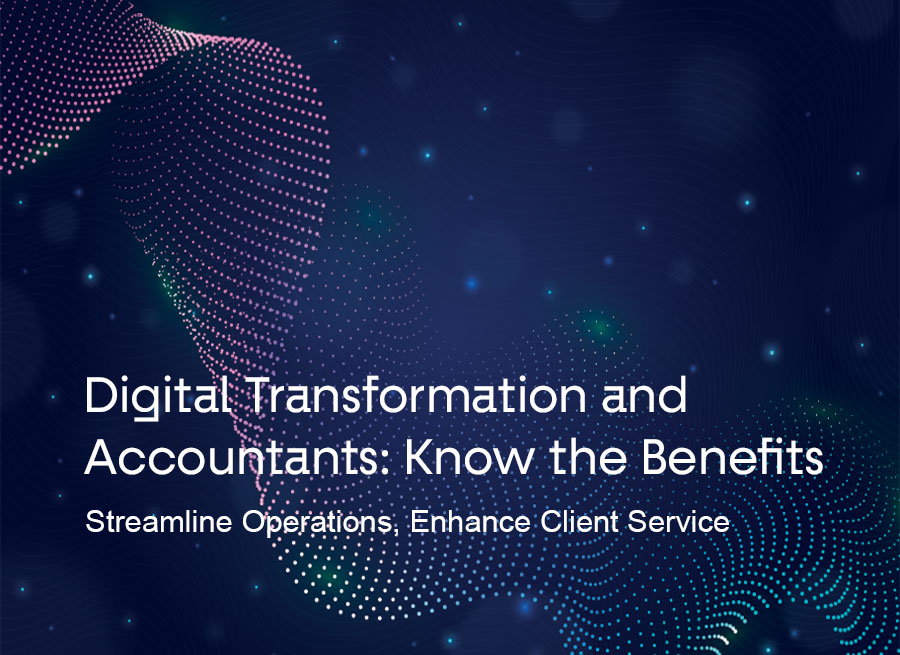In today's rapidly evolving digital landscape, the accounting profession is experiencing a profound transformation. Digital transformation is not just a buzzword; it signifies a fundamental shift in how accounting firms operate, deliver services, and provide value to their clients. Let's delve into the numerous benefits digital transformation brings to accountants, positioning them for success in an increasingly competitive marketplace.
Understanding Digital Transformation in Accounting
Digital transformation in accounting involves leveraging advanced technologies to streamline processes, enhance accuracy, and improve efficiency. It encompasses a range of innovations, including cloud computing, artificial intelligence (AI), machine learning, automation, and data analytics. By embracing these technologies, accountants can redefine their roles and deliver superior value to their clients.
Key Benefits of Digital Transformation for Accountants
- Enhanced Efficiency and Productivity:
- Automation of routine tasks such as data entry, reconciliations, and report generation reduces manual effort and minimizes errors.
- Cloud-based accounting software enables real-time collaboration, allowing accountants to work more efficiently and manage client accounts from anywhere, improving productivity and client engagement.
- Improved Accuracy and Compliance:
- AI-powered tools can analyze vast amounts of data with precision, reducing the likelihood of human error and ensuring compliance with regulatory requirements.
- Automated systems keep track of changing regulations, helping accountants stay current and avoid compliance pitfalls. This leads to more accurate and reliable financial reporting.
- Advanced Data Analytics and Insights:
- Data analytics tools enable accountants to extract actionable insights from financial data, facilitating more informed decision-making for clients.
- Predictive analytics can identify trends and forecast future financial scenarios, helping clients plan strategically and make data-driven decisions that can lead to better financial outcomes.
- Enhanced Client Service:
- Digital tools provide clients with real-time access to their financial information, improving transparency and trust.
- Accountants can offer more personalized services, leveraging data to provide tailored advice and solutions, enhancing the client experience and building stronger client relationships.
- Cost Savings:
- Automation and cloud computing reduce the need for physical infrastructure and lower operational costs.
- Streamlined processes and improved efficiency result in significant time savings, allowing accountants to focus on higher-value tasks such as advisory services and strategic planning.
Embracing Key Technologies in Accounting
- Cloud Computing:
- Cloud-based accounting platforms such as QuickBooks Online and Xero provide real-time access to financial data, facilitating collaboration and improving data security. Cloud solutions also ensure that data is backed up and accessible from any location, which is crucial for remote work.
- Artificial Intelligence and Machine Learning:
- AI-powered tools like Xero’s cash flow prediction and QuickBooks’ automated categorization of expenses streamline tasks and enhance accuracy. These tools can also provide deeper insights into financial data, helping accountants identify patterns and anomalies quickly.
- Blockchain Technology:
- Blockchain offers a secure and transparent way to manage financial transactions, reducing the risk of fraud and simplifying audit processes. It ensures the integrity of financial data and provides a clear audit trail, which is essential for maintaining trust and compliance.
- Robotic Process Automation (RPA):
- RPA automates repetitive tasks such as invoice processing and payroll management, freeing up accountants to focus on strategic activities. This technology increases efficiency and accuracy, allowing accountants to allocate more time to value-added services.
Challenges and Considerations
While the benefits of digital transformation are substantial, accountants must also navigate potential challenges, including:
- Data Security: Ensuring the protection of sensitive financial data is paramount. Implementing robust cybersecurity measures is crucial to safeguard against data breaches and cyber threats.
- Skill Development: Accountants need to acquire new skills to effectively use digital tools. Continuous learning and professional development are essential to stay ahead in a rapidly changing technological landscape.
- Change Management: Transitioning to digital systems requires careful planning and management to minimize disruptions and ensure a smooth transition. It involves not only adopting new technologies but also fostering a culture of innovation and adaptability.
The Future of Accounting in the Digital Age
As digital transformation continues to reshape the accounting landscape, accountants who embrace these changes will be well-positioned to thrive. The integration of advanced technologies will not only enhance efficiency and accuracy but also enable accountants to provide more strategic and value-added services to their clients.
Are you ready to embark on your digital transformation journey?
Contact us today to learn how our cutting-edge solutions can revolutionize your accounting practice. Let us help you harness the power of technology to enhance efficiency, improve client service, and drive growth.
Digital transformation offers a wealth of benefits for accountants, from enhanced efficiency and accuracy to improved client service and cost savings. By embracing advanced technologies, accountants can stay ahead of the curve, providing exceptional value to their clients and securing their place in the future of accounting.
 Digital Transformation and Accountants: Know the Benefitsby Admin | 02 Aug 2024 | Insights
Digital Transformation and Accountants: Know the Benefitsby Admin | 02 Aug 2024 | Insights